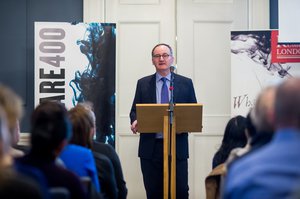Shakespeare400: A life’s work. A 400-year legacy. A year of celebrations.
Post by Gordon McMullan, Professor of English and Academic Director of Shakespeare 400

Gordon McMullan speaking at (one of many) S400 events
The creation of Shakespeare400 began as far back as 2011 in the build-up to the ever-so-slightly-random attachment of Shakespeare to the London Olympics in the shape of the World Shakespeare Festival. The exact occasion was the signing of a memorandum of understanding between King’s College London and the National Theatre so that NT Live showings could take place at King’s’ Strand campus. I had been researching the fascinating life and work of Israel Gollancz, professor of English at King’s in the early twentieth century, and in particular his genial, indefatigable leadership of the various committees that sought to mark the Shakespeare Tercentenary of 1916, and two things struck me at once: one, that the Olympic Shakespeare activities might distract London’s cultural and creative organisations from thinking ahead to the real centenaries – the 450th anniversary of Shakespeare’s birth in 2014 and, most significantly, the 400th anniversary of his death in 2016 – and two, that it might perhaps be appropriate for King’s again to take a lead in a Shakespeare centenary.
So I spoke that evening (a bit impulsively, I realise) to Rick (Sir Richard) Trainor, then principal of King’s, and to Nick Starr, then chief executive of the NT, and asked if they thought that there might be value in our investigating the possibility of creating an umbrella organisation for 2016. They did, so we began work.
It has been a fascinating process, as you would expect. It began with conversations. We toured the offices of some of the key organisations – the Globe, the NT, the Barbican – and we found to our happiness that it wasn’t necessary to begin with lengthy explanations of who we were and what we were proposing because there was invariably someone working in each office who had taken the MA in Shakespeare Studies we have co-taught with Globe Education for fifteen years now and this person would already have told his/her colleagues all about us. (Favourably, I might add.)
The good will we encountered was extraordinary and really quite unexpected. It clearly helped that King’s was, in the view of these cultural organisations, a neutral entity, not a brand rival – but, more to the point, it was simply that we were thinking ahead and that the organisations had either been planning to do something in 2016 and had been wondering if there might be a cohering body, or that they had not yet thought ahead to 2016 but were glad of the prompt.
And so we proceeded – in particular with the aim of moving beyond the World Shakespeare Festival’s mainly theatrical focus so as to address all the artistic forms on which Shakespearean creativity has had an influence – to speak to a significant proportion of the major creative organisations in London, and thus the consortium emerged.
(I will write further blogs on the creation of S400 in due course.)

